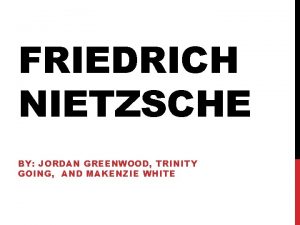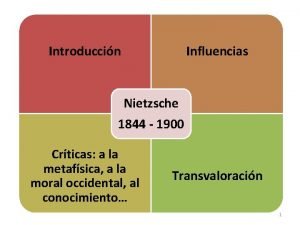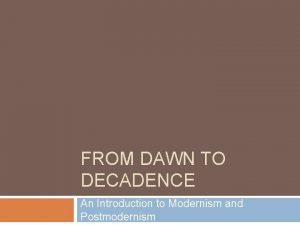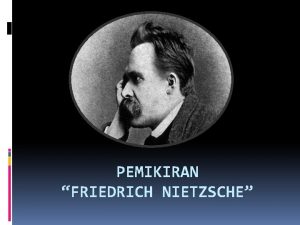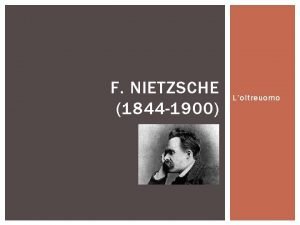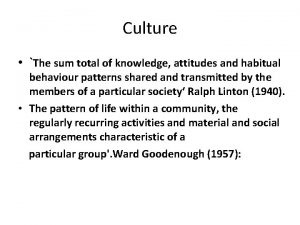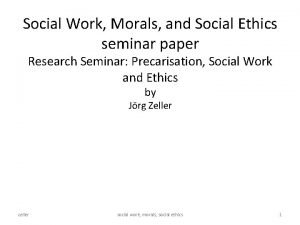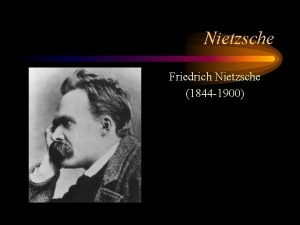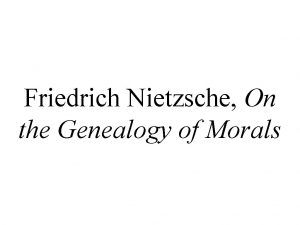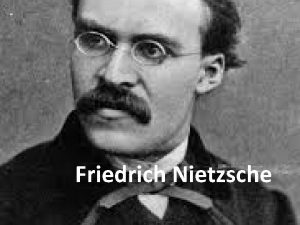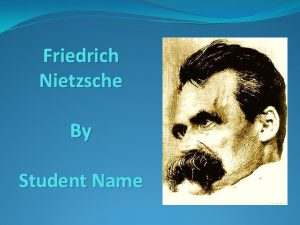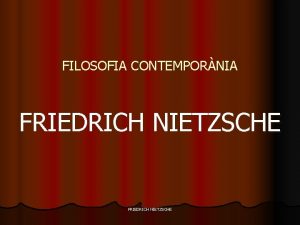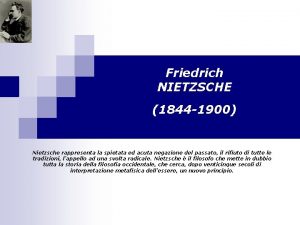Friedrich Nietzsche On the Genealogy of Morals Nietzsches










- Slides: 10

Friedrich Nietzsche: On the Genealogy of Morals �Nietzsche's complaint � Philosophers do not adequately take into account the history of moral terms.

Friedrich Nietzsche: On the Genealogy of Morals �Nietzsche's complaint � Philosophers do not adequately take into account the history of moral terms. � Because of this, they assume that unegoistic actions were always regarded as good.

Friedrich Nietzsche: On the Genealogy of Morals �Nietzsche's complaint � Philosophers do not adequately take into account the history of moral terms. � Because of this, they assume that unegoistic actions were always regarded as good. �Nietzsche's genealogical method � By tracing the history of our ethical concepts and showing how they have changed over time, Nietzsche hopes to undermine the conventional moral values they support.

Friedrich Nietzsche: On the Genealogy of Morals �The origin of “good and bad” � “The ‘good’ themselves—that is, the noble, the powerful, the superior, and the high-minded—were the ones who felt themselves and their actions to be good. . . and posited them as such. ” � They did not regard unegoistic actions as good, but approved of actions that enhanced their power. � It was only the resentiment of the weak that brought about a transvaluation of these values.

Friedrich Nietzsche: On the Genealogy of Morals �Master and slave morality � Master morality: Originally created by the strong and powerful, who regarded themselves as “good, ” and the weak and powerless as “bad. ”

Friedrich Nietzsche: On the Genealogy of Morals �Master and slave morality � Master morality: Originally created by the strong and powerful, who regarded themselves as “good, ” and the weak and powerless as “bad. ” � Slave morality: Created by the weak and powerless out of resentment for the strong and powerful, who they labeled “evil. ”

Friedrich Nietzsche: On the Genealogy of Morals �Master and slave morality � Master morality: Originally created by the strong and powerful, who regarded themselves as “good, ” and the weak and powerless as “bad. ” � Slave morality: Created by the weak and powerless out of resentment for the strong and powerful, who they labeled “evil. ” �Thus, while the master morality begins positively with a concept of the strong and noble and labels it “good, ” the slave morality begins negatively with a concept of that which is hated and labels it “evil. ”

Friedrich Nietzsche: On the Genealogy of Morals �Guilt and bad conscience � Our idea of conscience is the product of a long history of transformations. � It did not arise from the practice of punishment. � Bad conscience originally arose from our transition to civilized society, which required the increased use of conscious reflection, and the inhibition of our instincts, which we then turned on ourselves. � Guilt reaches its peak with the sense of indebtedness to the Christian God for sacrificing himself.

Friedrich Nietzsche: On the Genealogy of Morals �Asceticism � Asceticism is born of ressentiment, when an unsatisfied instinct leads one to try to repress it. � “The ascetic ideal is derived from the protective and healing instinct of a degenerating life. ” � Ultimately, asceticism represents “a will to nothingness, an aversion to life, a rebellion against the most fundamental preconditions of life, but which is and remains none the less a will. . . man would rather will nothingness than not will at all. ”

Friedrich Nietzsche: On the Genealogy of Morals �Asceticism � Asceticism is born of ressentiment, when an unsatisfied instinct leads one to try to repress it. � “The ascetic ideal is derived from the protective and healing instinct of a degenerating life. ” � Ultimately, asceticism represents “a will to nothingness, an aversion to life, a rebellion against the most fundamental preconditions of life, but which is and remains none the less a will. . . man would rather will nothingness than not will at all. ” �Becoming the author of Value
 Friedrich nietzsche influenced by
Friedrich nietzsche influenced by Slave morality
Slave morality Friedrich nietzsche
Friedrich nietzsche Apollinisch dionysisch schelling
Apollinisch dionysisch schelling Friedrich nietzsche on christianity
Friedrich nietzsche on christianity Pemikiran friedrich nietzsche
Pemikiran friedrich nietzsche Superuomo di nietzsche
Superuomo di nietzsche Small friends can be powerful allies meaning
Small friends can be powerful allies meaning Attitude is the sum of values and beliefs
Attitude is the sum of values and beliefs Seminar paper
Seminar paper Morals and virtues
Morals and virtues
